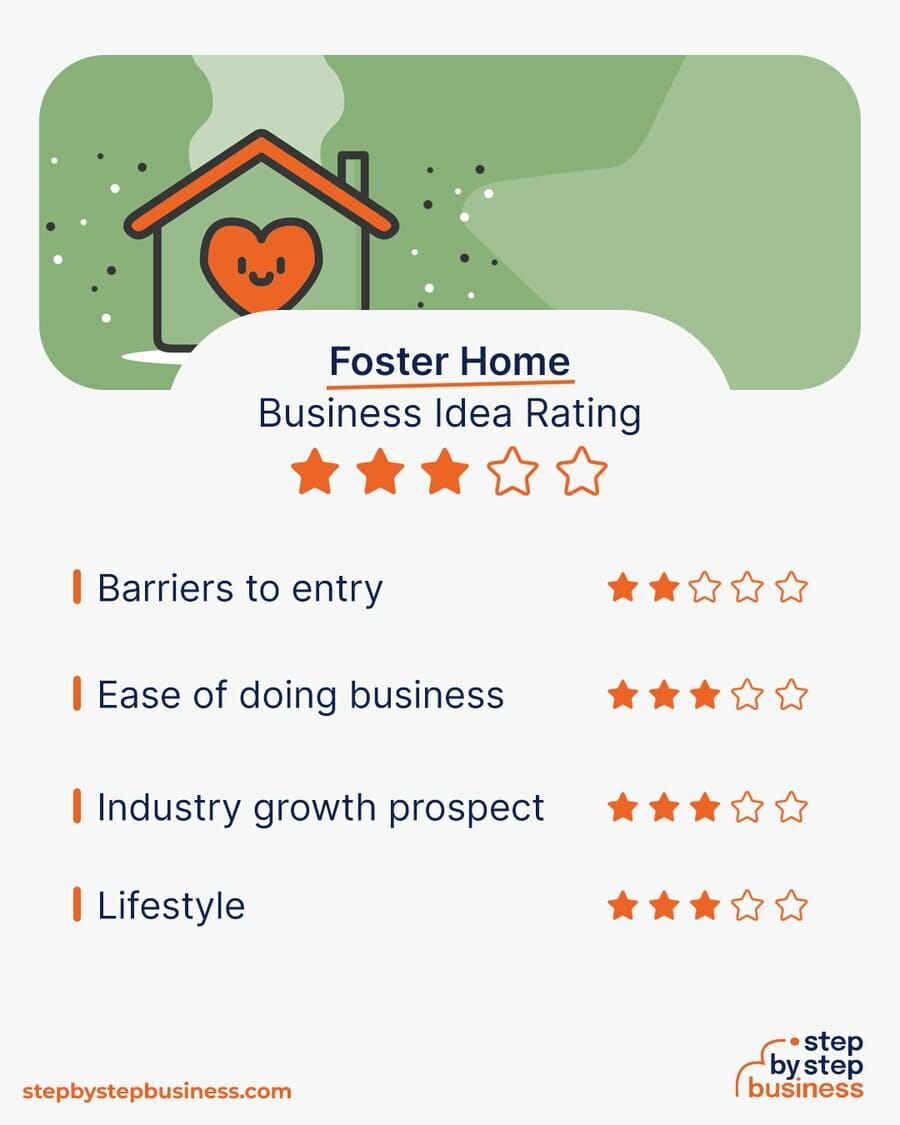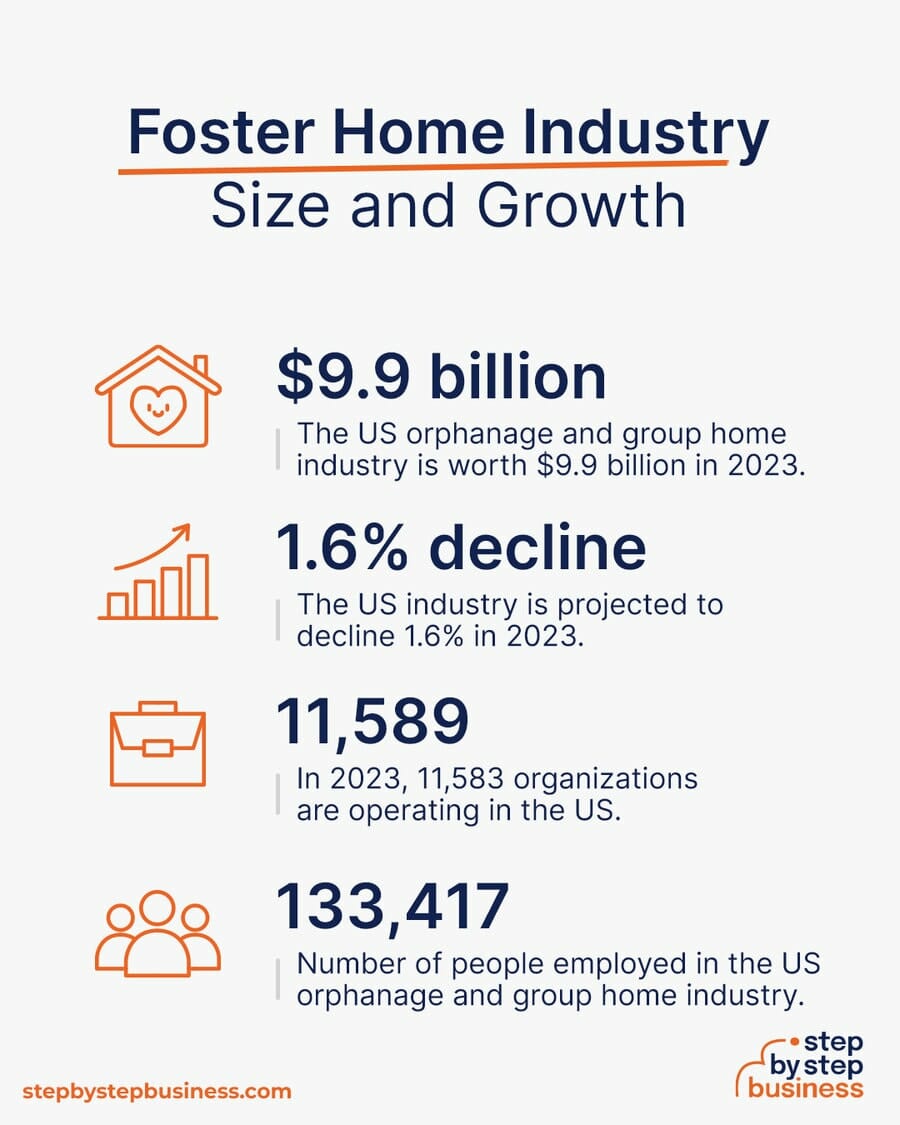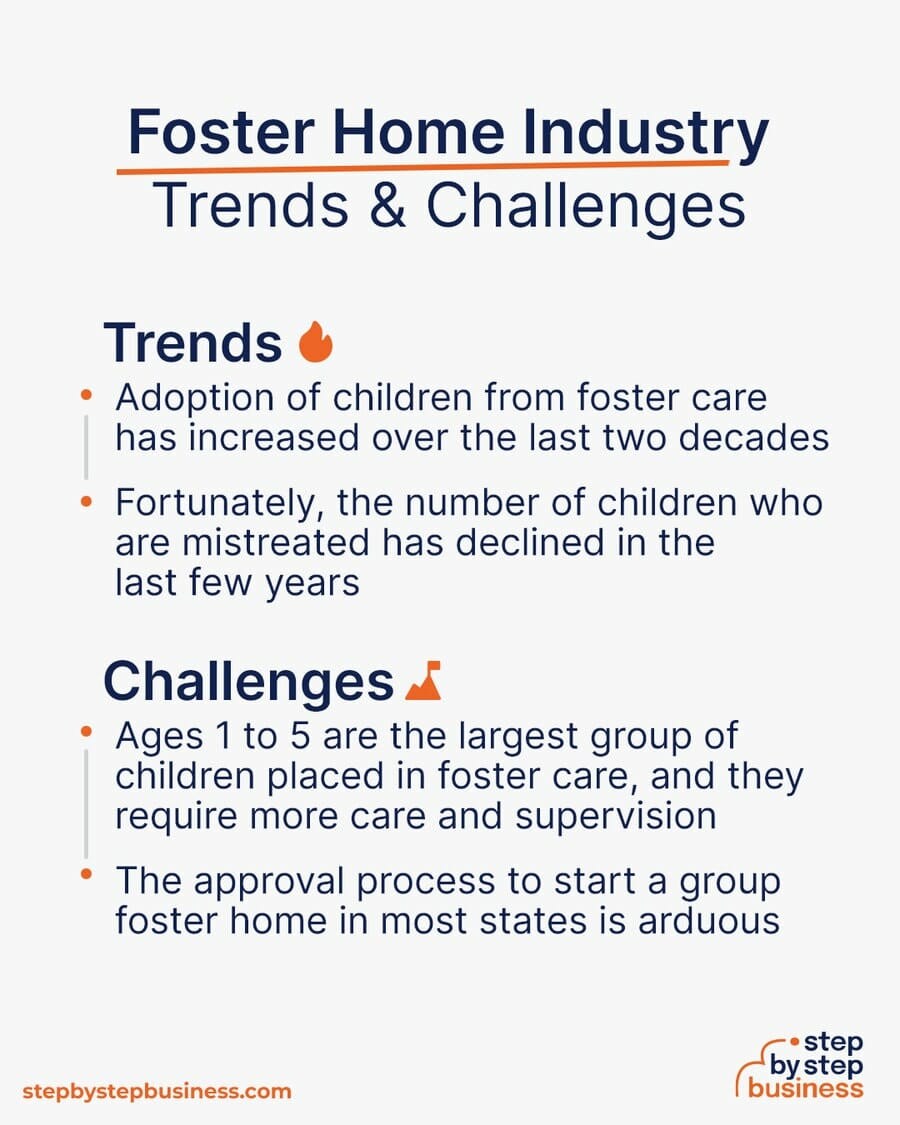Social work is a noble pursuit, though not terribly lucrative. If you want to help people but would rather make a better living, many alternativebus ...
You might consider targeting a niche, such as therapeutic foster care.
We earn commissions if you shop through the links below. Read more
Written by: Carolyn Young
Carolyn Young is a business writer who focuses on entrepreneurial concepts and the business formation. She has over 25 years of experience in business roles, and has authored several entrepreneurship textbooks.
Edited by: David Lepeska
David has been writing and learning about business, finance and globalization for a quarter-century, starting with a small New York consulting firm in the 1990s.
Published on June 5, 2023

Investment range
$400,800 - $602,300
Revenue potential
N/A
Time to build
6 – 12 months
Profit potential
$35,000 - $45,000 p.a.
Industry trend
Declining
Commitment
Full-time
Consider these crucial factors when launching your foster home:



Trends
Challenges
The costs to start a group foster home are significant, but many state programs and even federal grants are available to cover the costs. The costs can range from $400,000 to $600,000.
| Start-up Costs | Ballpark Range | Average |
|---|---|---|
| Setting up a business name and corporation | $100 - $500 | $300 |
| Business licenses and permits | $100 - $300 | $200 |
| Insurance | $100-$500 | $300 |
| Website | $500 - $1,000 | $750 |
| Space rental and preparation | $200,000 - $300,000 | $250.000 |
| Operating budget for labor and overhead | $200,000 - $300,000 | $250.000 |
| Total | $400,800 - $602,300 | $501,550 |
Your expenses should be covered by state funding and grants, but again, you can pay yourself a reasonable salary as your budget allows. For a group foster home manager, salaries can range from $35,000 to $45,000.
There are a few barriers to entry for a foster home. Your biggest challenges will be:
Now that you know what’s involved in starting a foster home, it’s a good idea to hone your concept in preparation.
Research group foster homes in your area to examine their services. You’re looking for a market gap to fill. For instance, maybe the local market is missing a group foster home that offers psychiatric care.
You might consider targeting a niche, such as therapeutic foster care.
You’ll be providing basic care for the children in your home, but you can offer additional services such as therapy and tutoring.
Your “market” for a group foster home is general going to be child welfare agencies and social services agencies. You’ll want to establish a network of relationships with various agencies who will place children in your care.
You’ll need to rent out a space for your foster home that has multiple rooms that can be bedrooms, and that also has a kitchen. You can find commercial space to rent in your area on sites such as Craigslist, Crexi, and Instant Offices.
Here are some ideas for brainstorming your business name:
Once you’ve got a list of potential names, visit the website of the US Patent and Trademark Office to make sure they are available for registration and check the availability of related domain names using our Domain Name Search tool below. Using “.com” or “.org” sharply increases credibility, so it’s best to focus on these.
Finally, make your choice among the names that pass this screening and go ahead and reserve your business name with your state, start the trademark registration process, and complete your domain registration and social media account creation.
Your business name is one of the key differentiators that sets your business apart. Once you pick a name, reserve it and start with the branding, it’s hard to switch to a new name. So be sure to carefully consider your choice before moving forward.
Here are the key components of a business plan:

If you’ve never created a business plan, it can be an intimidating task. You might consider hiring a business plan specialist to create a top-notch business plan for you.
Registering your business is an absolutely crucial step — it’s the prerequisite to paying taxes, raising capital, opening a bank account, and other guideposts on the road to getting a business up and running.
Plus, registration is exciting because it makes the entire process official. Once it’s complete, you’ll have your own business!
Your business location is important because it can affect taxes, legal requirements, and revenue. Most people will register their business in the state where they live, but if you are planning to expand, you might consider looking elsewhere, as some states could offer real advantages when it comes to foster homes.
If you’re willing to move, you could really maximize your business! Keep in mind, it’s relatively easy to transfer your business to another state.
Business entities come in several varieties, each with its pros and cons. The legal structure you choose for your foster home will shape your taxes, personal liability, and business registration requirements, so choose wisely.
Here are the main options:

A foster home is best registered as a non-profit organization with the state so that you can get state funding and grants. You’ll also need to apply for 501(c)3 tax status.
The final step before you’re able to pay taxes is getting an Employer Identification Number, or EIN. You can file for your EIN online or by mail or fax: visit the IRS website to learn more. Keep in mind, if you’ve chosen to be a sole proprietorship, you can simply use your social security number as your EIN.
Once you have your EIN, you’ll need to choose your tax year. Financially speaking, your business will operate in a calendar year (January–December) or a fiscal year, a 12-month period that can start in any month. This will determine your tax cycle, while your business structure will determine which taxes you’ll pay.
The IRS website also offers a tax-payers checklist, and taxes can be filed online.
It is important to consult an accountant or other professional to help you with your taxes to ensure you are completing them correctly.
Securing financing is your next step and there are plenty of ways to raise capital:

Your best bets for funding are state programs and grants, as well as donations from charitable organizations.
Starting a foster home business requires obtaining a number of licenses and permits from local, state, and federal governments.
You’ll have to follow the group foster home licensing requirements in your state.
Federal regulations, licenses, and permits associated with starting your business include doing business as (DBA), health licenses and permits from the Occupational Safety and Health Administration (OSHA), trademarks, copyrights, patents, and other intellectual properties, as well as industry-specific licenses and permits.
You may also need state-level and local county or city-based licenses and permits. The license requirements and how to obtain them vary, so check the websites of your state, city, and county governments or contact the appropriate person to learn more.
You could also check this SBA guide for your state’s requirements, but we recommend using MyCorporation’s Business License Compliance Package. They will research the exact forms you need for your business and state and provide them to ensure you’re fully compliant.
This is not a step to be taken lightly, as failing to comply with legal requirements can result in hefty penalties.
If you feel overwhelmed by this step or don’t know how to begin, it might be a good idea to hire a professional to help you check all the legal boxes.
Before you start making money, you’ll need a place to keep it, and that requires opening a bank account.
Keeping your business finances separate from your personal account makes it easy to file taxes and track your company’s income, so it’s worth doing even if you’re running your foster home business as a sole proprietorship. Opening a business bank account is quite simple, and similar to opening a personal one. Most major banks offer accounts tailored for businesses — just inquire at your preferred bank to learn about their rates and features.
Banks vary in terms of offerings, so it’s a good idea to examine your options and select the best plan for you. Once you choose your bank, bring in your EIN (or Social Security Number if you decide on a sole proprietorship), articles of incorporation, and other legal documents and open your new account.
Business insurance is an area that often gets overlooked yet it can be vital to your success as an entrepreneur. Insurance protects you from unexpected events that can have a devastating impact on your business.
Here are some types of insurance to consider:

As opening day nears, prepare for launch by reviewing and improving some key elements of your business.
Being an entrepreneur often means wearing many hats, from marketing to sales to accounting, which can be overwhelming. Fortunately, many websites and digital tools are available to help simplify many business tasks.
Website development is crucial because your site is your online presence and needs to convince prospective clients of your expertise and professionalism. You can create your own website using services like WordPress, Wix, or Squarespace. This route is very affordable, but figuring out how to build a website can be time-consuming. If you lack tech-savvy, you can hire a web designer or developer to create a custom website for your business.
Your customers are unlikely to find your website, however, unless you follow Search Engine Optimization (SEO) practices. SEO will help your website appear closer to the top in relevant search results, a crucial element for increasing sales.
Make sure that you optimize calls to action on your website. Experiment with text, color, size, and position of calls to action such as “Contact Now”.
Here are some powerful marketing strategies for your future business:

Unique selling propositions, or USPs, are the characteristics of a product or service that sets it apart from the competition. Customers today are inundated with buying options, so you’ll have a real advantage if they are able to quickly grasp how your foster home meets their needs or wishes. It’s wise to do all you can to ensure your USPs stand out on your website and in your marketing and promotional materials, stimulating buyer desire.
Global pizza chain Domino’s is renowned for its USP: “Hot pizza in 30 minutes or less, guaranteed.” Signature USPs for your foster home business could be:
You may not like to network or use personal connections for business gain. But your personal and professional networks likely offer considerable untapped business potential. Maybe that Facebook friend you met in college is now running a foster home business, or a LinkedIn contact of yours is connected to dozens of potential clients. Maybe your cousin or neighbor has been working in foster homes for years and can offer invaluable insight and industry connections.
The possibilities are endless, so it’s a good idea to review your personal and professional networks and reach out to those with possible links to or interest in foster homes. You’ll probably generate new customers or find companies with which you could establish a partnership.
You will need workers to fill various roles. Potential positions for a foster home business include:
At some point, you may need to hire all of these positions or simply a few, depending on the size and needs of your business. You might also hire multiple workers for a single role or a single worker for multiple roles, again depending on need.
Free-of-charge methods to recruit employees include posting ads on popular platforms such as LinkedIn, Facebook, or Jobs.com. You might also consider a premium recruitment option, such as advertising on Indeed, Glassdoor, or ZipRecruiter. Further, if you have the resources, you could consider hiring a recruitment agency to help you find talent.
Starting a foster home can be one of the most rewarding pursuits that you can choose. Thousands of children, unfortunately, suffer from abuse and neglect and need a healthy environment in which to live and hopefully thrive. By starting a foster home, you’ll have the chance to make a positive impact on these children.
Now that you understand what’s involved, you’re ready to contact your state agencies and get the process of launching your foster home started.
While it is possible to start a group foster home in most states, each state has its own licensing and certification process. This includes meeting specific criteria related to the physical space, staff qualifications, background checks, and compliance with health and safety standards. It’s crucial to familiarize yourself with the regulations and licensing requirements of the particular state you are interested in.
Funding for group foster homes varies significantly by state. Some states provide substantial funding and support to group foster homes, while others may offer limited financial assistance. Funding typically comes from a combination of state, federal, and local resources, and the amount can depend on factors such as the number of children served, the level of care provided, and the specific programs offered. To determine the funding available, you would need to research the policies and funding options specific to your state.
The requirements to start a group foster home generally involve meeting licensing standards, which often include factors such as:
Not all group foster homes are state funded. While some group foster homes rely heavily on state funding to cover operational costs, others may receive funding from private sources, grants, or philanthropic organizations. The availability and level of state funding can vary widely depending on the location and the specific programs and services offered by the foster home.

Published on April 22, 2023
Social work is a noble pursuit, though not terribly lucrative. If you want to help people but would rather make a better living, many alternativebus ...
Read Now

Published on November 4, 2022
More than 60 million US adults live with a disability. Though many companies tout their commitment to inclusion, many disabled people are relegatedt ...
Read Now

Published on July 29, 2022
Just about everybody wants to live in a warm, welcoming close-knit community, and you can help build one by starting a business that helps peopleliv ...
Read Now
No thanks, I don't want to stay up to date on industry trends and news.
this site was very useful and gain very valuable information.